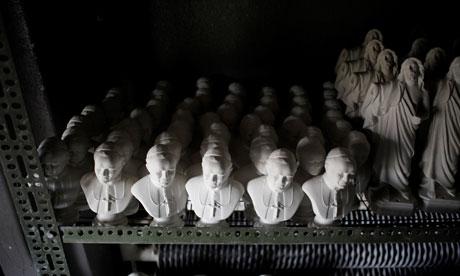Pope Francis Should Give US a Break from This Flurry of Papal Saints
By Paul Vallely
Elevating John XXIII and John Paul II to sainthood is political and divisive. It's time the church closed its dead popes society The date for the arrival of two more saints within the Catholic church will be announced on 30 September. So what's two more, given the recent deluge from the Vatican? After all, Pope John Paul II, all by himself, created more saints than all the previous popes put together. But this time John Paul II is to be one of them, along with a predecessor pope, John XXIII. This is a bad idea. For the first half of Christianity's 2,000-year history, saints were created by the acclamation of ordinary believers. It often took centuries for the church authorities to then give official endorsement to this demotic sanctification. But John Paul II's elevation to sainthood must be the fastest in history. His successor, Benedict XVI, even dispensed with the requirement that the dead pope had to wait a minimum of five years before the sainting process could begin. There was a point to institutionalising delay in the procedure. A saint is an individual whose "heroic virtue" is an exemplar for others. The passing of the years allowed any personal failings the future saint may have had to be eclipsed by that virtue in popular memory. But ever since the Vatican took control of canonisations in the 11th century, periodically tightening its control ever since, the process has become politicised. Pope Benedict's fast-tracking of his predecessor's beatification was, in part, an attempt to consolidate his conservative legacy – and create a bulwark against what both men saw as the excesses of the second Vatican council which revolutionised Catholicism in the 1960s. And there is a political dimension to Monday's announcement. The Polish pope's canonisation had been approved before Pope Francis took over. So Francis will couple it with the canonisation of John XXIII – the pope who launched the Vatican II revolution in the 1960s and whose cause had stalled under Benedict. Francis is clearly trying to neutralise the political impact of the rush to make John Paul II a saint by offering a liberal counterpart to this great conservative icon: "Good Pope John" will balance "John Paul the Great". The Polish pope's supporters are clear about the case for his greatness. The globetrotting rock-stadium-star pontiff was the most popular pope in modern times; some 17 million people travelled to Rome to see him in his time as history's second longest-serving pope. He played a key role in the fall of Soviet-bloc communism. He was the first pope to visit a synagogue and a mosque. He went to Auschwitz and Jerusalem's Western Wall and repeatedly begged forgiveness for centuries of Christian slander of the Jews. He apologised, finally, for the Crusades and the persecution of Galileo. And he gave dignity to the dying by his own protracted public illness. But if the first half of his papacy was good for the world, the second was bad for the church. He suppressed debate, silenced theologians and outlawed discussion on women priests. He applied his condemnations of the "dictatorship of relativism" to pluralistic societies without qualification. The Vatican II doctrine of collegiality was changed to mean that bishops were being collegial if they agreed with him – and he appointed bishops who did that. Most grievously, for decades he ignored the mounting evidence of priestly sex abuse which devastated thousands of lives. And he refused to take action against the serial abuser Father Marcial Maciel, the founder of the conservative Legionaries of Christ later suspended by Pope Benedict. The skill set for a pope and a saint are far from the same. But there is enough about John Paul II's record to echo the conclusion many reached when Margaret Thatcher was awarded a virtual state funeral: some figures are too controversial and divisive to be accorded a universal acclaim. There is, in any case, something dodgy about a dead popes society, smacking as it does of heavenly joys for the boys. If we are to have saints they should, as John Paul II to his credit understood, be drawn from the ranks of lay women and men, not just the ordained. Pope Francis should make it clear that, after this, there will be no more fast-tracked papal saints. Or at very least put the whole business on hold for a couple of centuries.
|
.
Any original material on these pages is copyright © BishopAccountability.org 2004. Reproduce freely with attribution.
